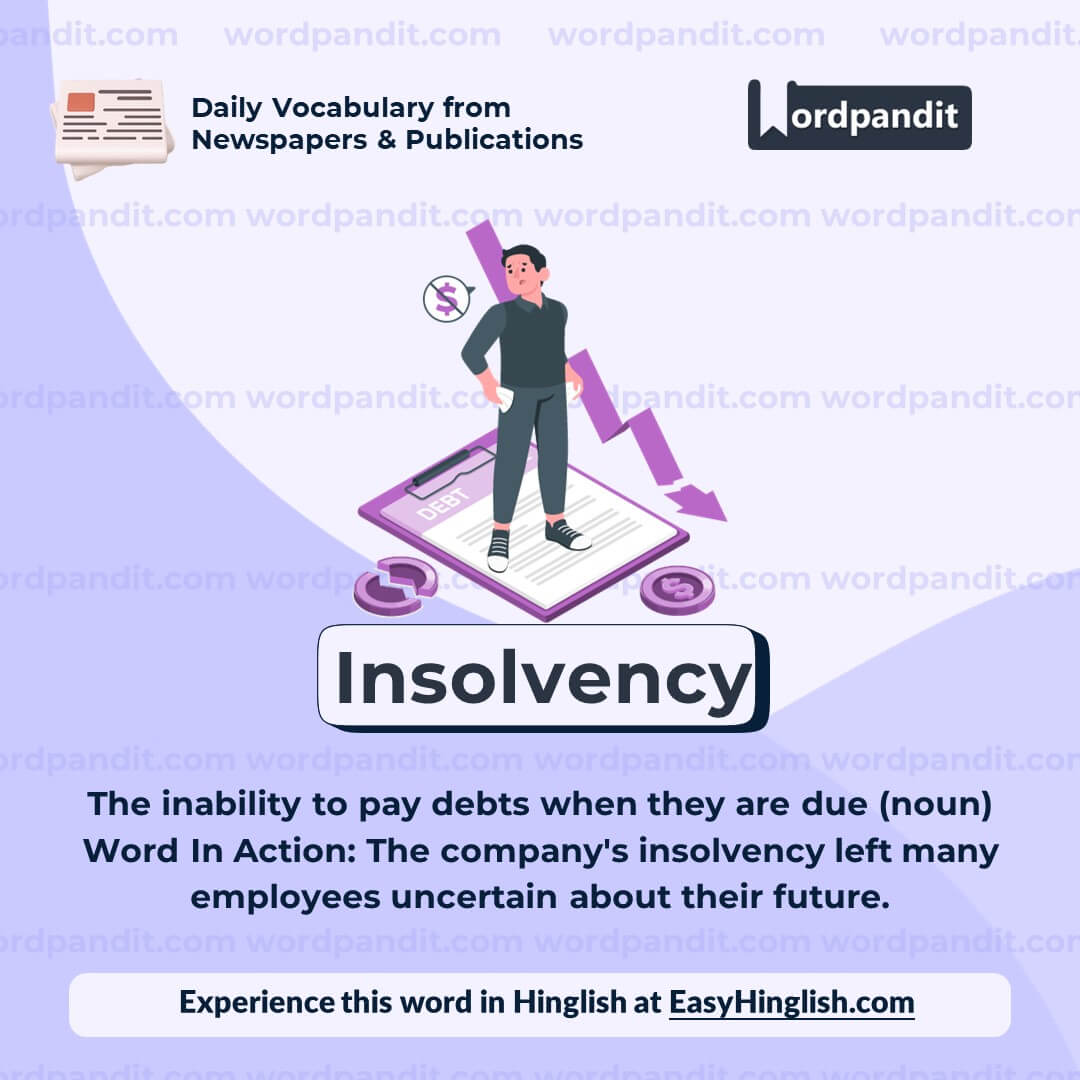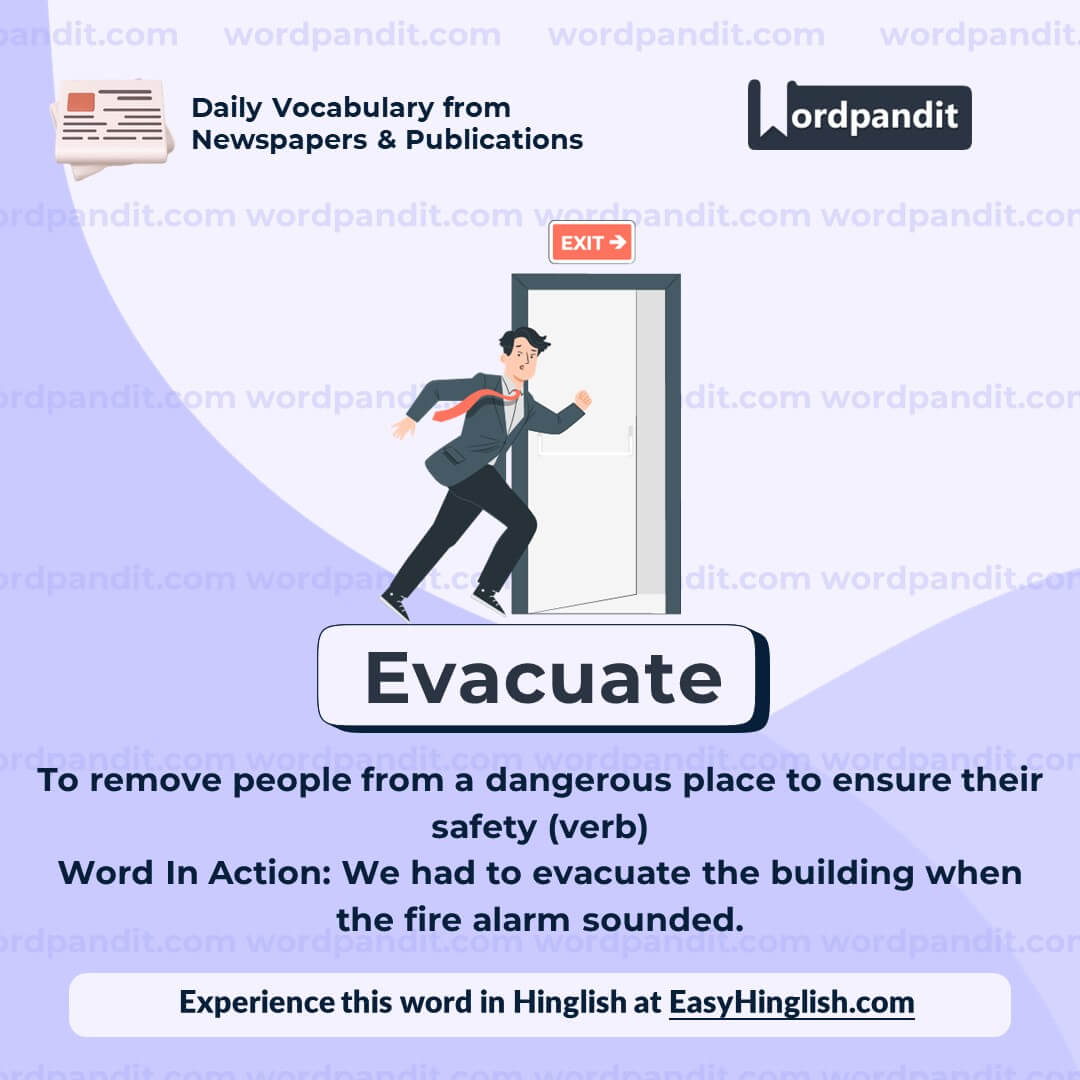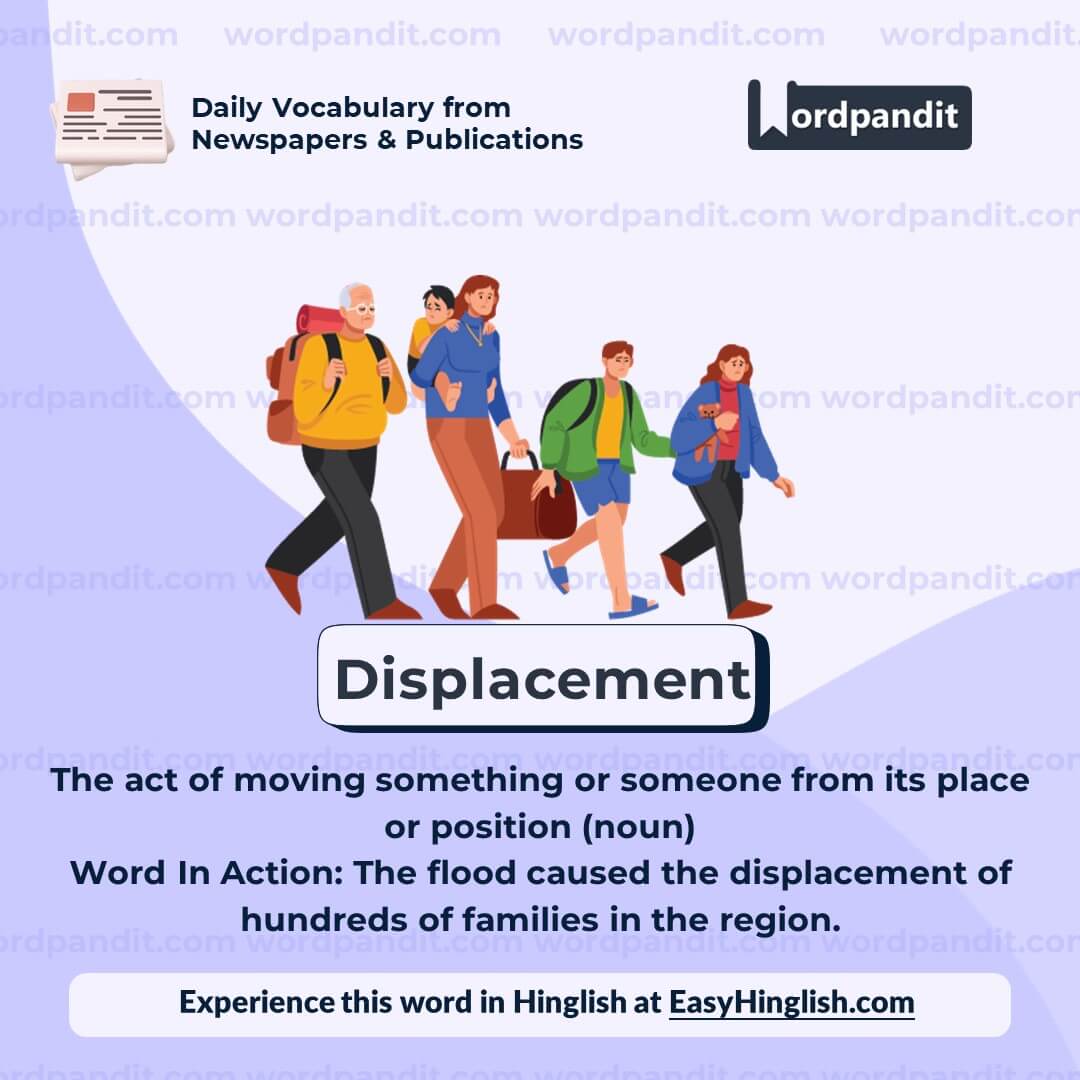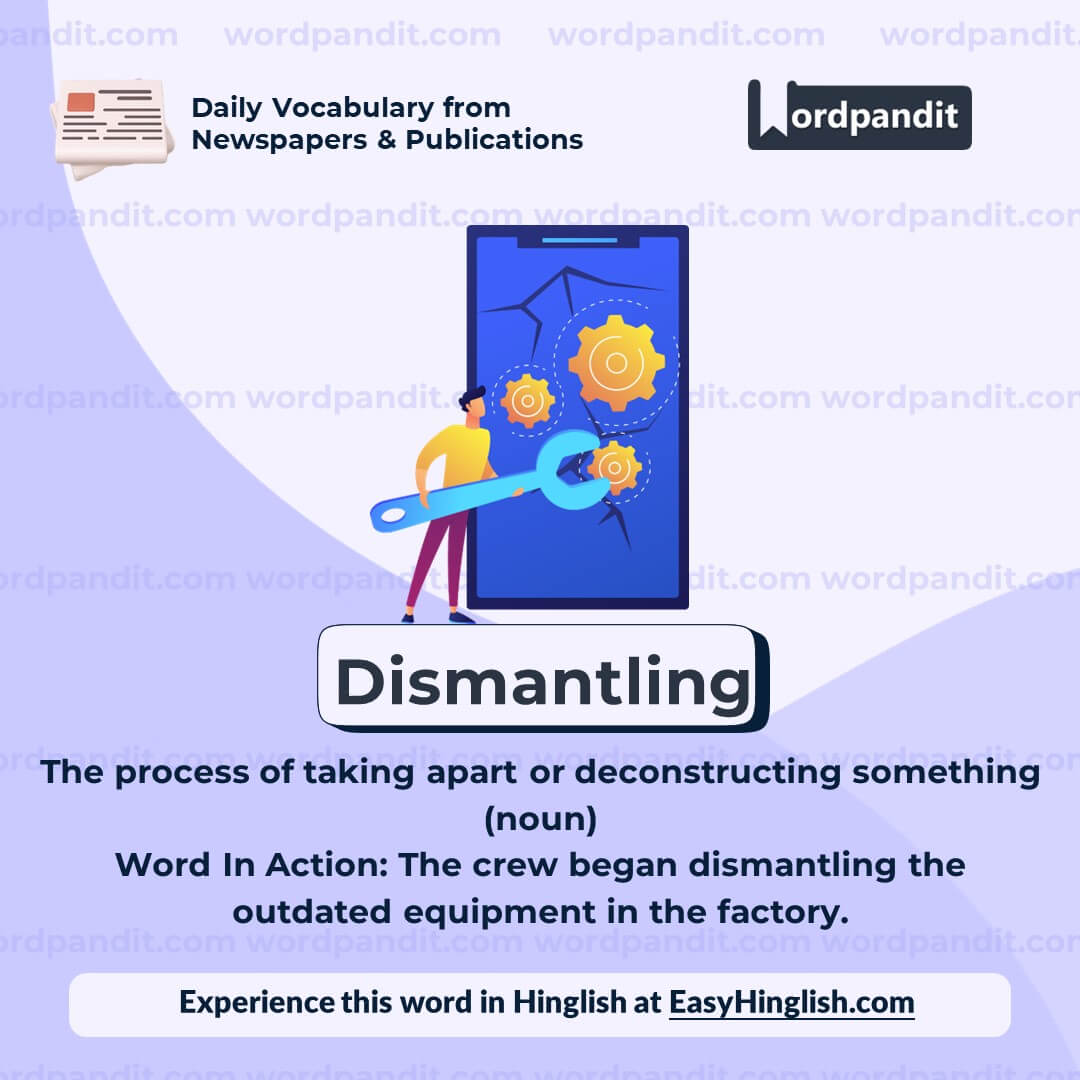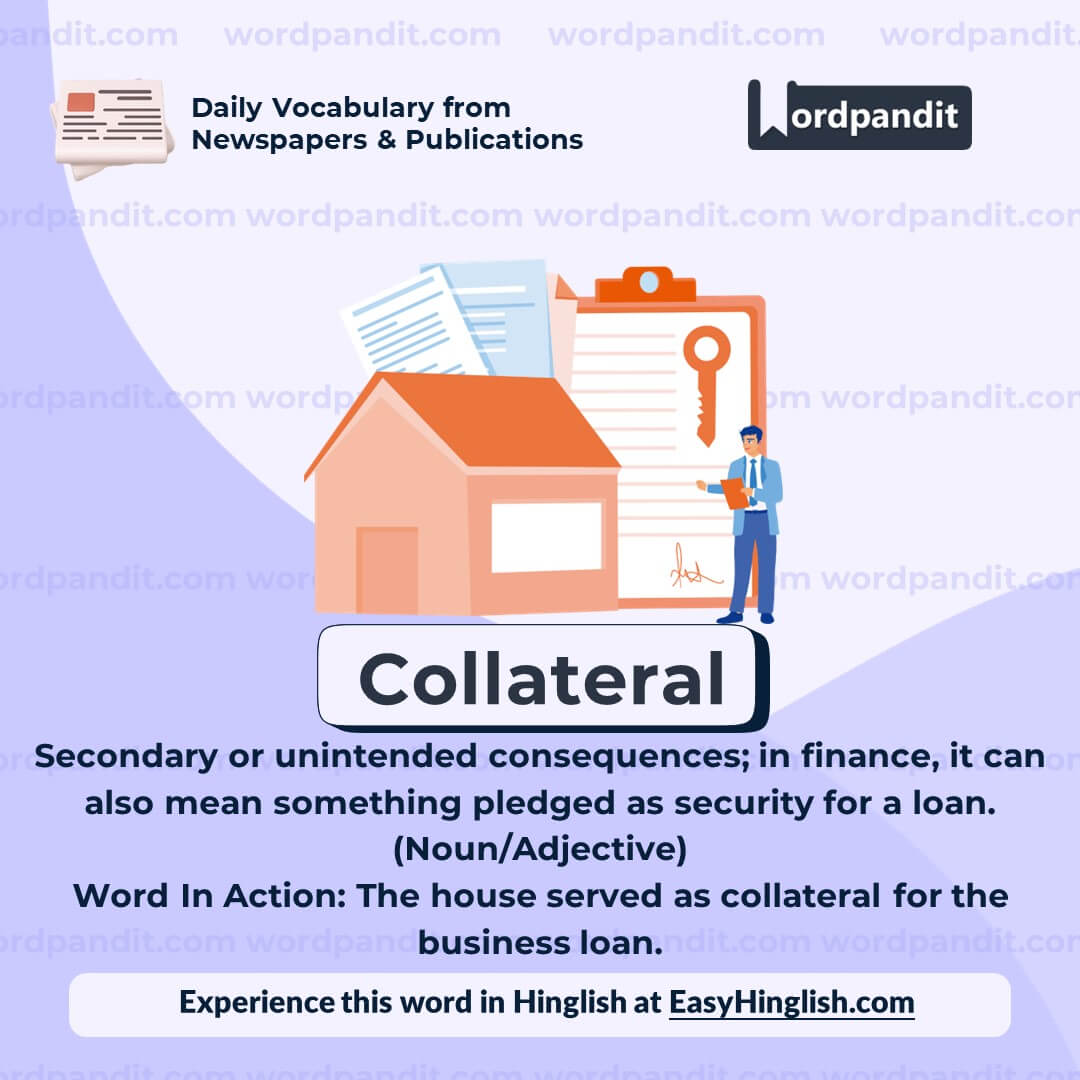Daily Vocabulary from Indian Newspapers and Publications
Welcome to Wordpandit’s Indian Vocabulary Hub
At Wordpandit, we understand the importance of staying rooted in the local context while expanding your language skills. This section focuses on enriching your vocabulary with words and phrases drawn from India’s leading newspapers and publications, ensuring you're learning vocabulary that is practical, relevant, and uniquely Indian.
Why Indian Sources Matter
We believe that the best way to master any language is by immersing yourself in local content. That’s why we carefully curate vocabulary from top Indian publications, including:
- The Hindu
- The Times of India
- The Economic Times
- Hindustan Times
- Live Mint
- The Indian Express
- And many others...
Stay Updated, Stay Relevant
With daily updates from Indian news sources, you’ll be consistently learning words that reflect the trends and shifts in Indian society and culture. Our focus is to provide vocabulary that enhances your understanding of the language in an Indian context.
How Wordpandit Supports Your Goals
Whether you’re preparing for exams, aiming to improve your professional communication, or simply want to stay connected with the latest Indian vocabulary, Wordpandit is here to guide you every step of the way.
Learn with a Practical Approach
Our interactive learning methodology includes real-world examples, engaging activities, and context-specific usage to ensure that every word becomes part of your active vocabulary.
Dive into Indian Vocabulary Today!
Why Choose Wordpandit?
Practical Learning: Focus on words you'll actually encounter in real-world reading, enhancing your comprehension and communication skills.
Diverse Content: From current affairs to scientific breakthroughs, our varied sources expose you to vocabulary across multiple domains.
Effortless Integration: Make Wordpandit a part of your daily routine. Just a few minutes each day can significantly boost your lexicon over time.
Your Path to Vocabulary Mastery
- Visit our Daily Vocabulary section regularly
- Explore new words and their usage in context
- Practice incorporating these words into your own writing and speech
- Track your progress as your vocabulary expands
Start Your Journey Today
Embark on your vocabulary enhancement journey with Wordpandit. By consistently engaging with our daily posts, you'll build a robust vocabulary that serves you well in academic, professional, and personal contexts.
Remember, a word a day keeps linguistic limitations at bay. Make Wordpandit your daily companion in the quest for vocabulary excellence!
WORD-1: Insolvency
Context:
"Resolving India’s NPA crisis requires a multi-pronged approach – strengthening the Insolvency and Bankruptcy Code to expedite recoveries, improving risk assessment practices, and ensuring greater accountability in loan write-offs are essential steps." - The Wire
Explanatory Paragraph:
Insolvency refers to a state where an individual or organization is unable to meet its financial obligations or repay debts as they come due. This situation often requires intervention through legal frameworks to resolve debts and protect stakeholders.
Meaning: The inability to pay debts when they are due (noun).
Pronunciation: in-SOL-ven-see
Difficulty Level: ⭐⭐⭐ Intermediate
Etymology: Derived from the Latin word "insolventem," meaning "unable to pay one's debts."
Synonyms & Antonyms:
Synonyms: bankruptcy, default, failure
Antonyms: solvency, affluence, profitability
Usage Examples:
- The company filed for insolvency after years of declining profits.
- The government's policies aim to prevent small businesses from sliding into insolvency.
- Personal insolvency rates have surged due to the economic downturn.
- Early intervention by creditors can often help avoid insolvency.
Cultural Reference:
"The Insolvency and Bankruptcy Code (IBC) of India, implemented in 2016, has been a game-changer in addressing corporate insolvencies and improving the ease of doing business." - Economic Times
Think About It:
How can nations balance the rights of creditors and debtors to ensure fair insolvency proceedings?
Quick Activity:
List three potential causes of insolvency for individuals and three for businesses. Then, suggest a strategy to mitigate each cause.
Memory Tip:
Think of "insolvency" as "in" + "solve" + "ency" — when you’re “in” trouble and can’t “solve” your financial problems, you’re in a state of insolvency.
Real-World Application:
Insolvency laws, such as the IBC in India or Chapter 11 in the United States, play a pivotal role in stabilizing economies by providing a systematic approach to debt resolution.
WORD-2: Evacuate
Context:
"In fact, our medical personnel and patients were forced to evacuate hospitals and health facilities 17 times, often in desperate attempts to save their own lives." - The New Indian Express
Explanatory Paragraph:
Evacuate means to leave a place, typically in an emergency, for reasons of safety or to avoid danger. It is often used in contexts of natural disasters, armed conflicts, or other hazardous situations.
Meaning: To remove people from a dangerous place to ensure their safety (verb).
Pronunciation: ee-VAK-yoo-ate
Difficulty Level: ⭐⭐ Beginner
Etymology: From the Latin "evacuare," meaning "to empty out."
Synonyms & Antonyms:
Synonyms: remove, clear out, empty, flee
Antonyms: remain, occupy, stay
Usage Examples:
- The residents were instructed to evacuate the building after the fire alarm went off.
- Due to the impending hurricane, authorities evacuated the entire coastal region.
- The army helped evacuate civilians trapped in the war zone.
- It’s important to have an evacuation plan in case of natural disasters.
Cultural Reference:
"Evacuate" gained prominence during World War II when large-scale evacuations of civilians, especially children, were organized to keep them safe from air raids in urban areas.
Think About It:
How can communities prepare for orderly evacuations during unexpected disasters?
Quick Activity:
Create a checklist for a family evacuation plan during an emergency. Include items to take and steps to follow.
Memory Tip:
Associate "evacuate" with "vacate" — both involve leaving a place, but "evacuate" is usually for safety reasons.
Real-World Application:
Evacuate is a key term in emergency management, used in announcements during disasters such as wildfires, earthquakes, and floods, ensuring people act promptly to avoid harm.
WORD-3: Displacement
Context:
"The ongoing devastation—including mass killings, severe physical and mental health injuries, forced displacement, and impossible conditions of life" - The New Indian Express
Explanatory Paragraph:
Displacement refers to the forced movement of people, animals, or objects from their usual location. It often occurs due to conflicts, natural disasters, or changes in societal structures, leading to emotional and physical upheavals. In this context, it highlights the plight of those uprooted from their homes and communities.
Meaning: The act of moving something or someone from its place or position (noun).
Pronunciation: diss-PLACE-ment
Difficulty Level: ⭐⭐⭐ Intermediate
Etymology: Derived from the Old French word "desplacer," meaning to remove or shift, and later adopted into English during the late 14th century.
Synonyms & Antonyms:
Synonyms: relocation, evacuation, migration, removal
Antonyms: settlement, stability, permanence
Usage Examples:
- The hurricane caused the displacement of thousands of families from their homes.
- Displacement due to war often leads to long-term refugee crises.
- The engineer studied the displacement of the bridge after the earthquake.
- Economic inequality can result in the displacement of vulnerable communities.
Cultural Reference:
"The term 'displacement' is frequently used in discussions of the global refugee crisis, as millions are forced to leave their homes due to wars and natural disasters." - United Nations High Commissioner for Refugees (UNHCR)
Think About It:
What long-term measures can governments and societies take to reduce the impact of displacement on affected individuals?
Quick Activity:
Identify three recent news events where displacement was a central issue and describe the reasons behind it.
Memory Tip:
Think of “displacement” as “dis-place-ment,” emphasizing the act of being removed or shifted from a 'place.'
Real-World Application:
Understanding displacement is crucial for addressing issues like urban planning, disaster management, and refugee rehabilitation programs, as these directly affect the well-being of displaced populations.
WORD-4: Dismantling
Context:
"Have seen my fair share of humanitarian crises. But what is unfolding in Gaza is beyond anything I have encountered in my career—a systematic dismantling of an entire society." - The New Indian Express
Explanatory Paragraph:
Dismantling refers to the act of systematically taking something apart, whether it is a physical structure, a system, or an organization. In this context, it emphasizes the deliberate and organized destruction of societal structures and institutions, leaving communities in chaos and despair.
Meaning: The process of taking apart or deconstructing something (noun).
Pronunciation: diss-MAN-tling
Difficulty Level: ⭐⭐⭐ Intermediate
Etymology: From the Middle French word "desmanteler," meaning to tear down or destroy, combining "des-" (meaning reversal or removal) and "manteler" (a covering or shelter).
Synonyms & Antonyms:
Synonyms: deconstruction, disassembly, demolition, destruction
Antonyms: construction, assembly, creation, establishment
Usage Examples:
- The dismantling of old industrial plants is necessary to make way for modern infrastructure.
- Environmental activists are calling for the dismantling of harmful policies that exploit natural resources.
- The company announced the dismantling of outdated management structures to promote efficiency.
- Dismantling apartheid systems in South Africa required decades of struggle and resilience.
Cultural Reference:
"Dismantling the Berlin Wall in 1989 marked the end of decades of division and symbolized the reunification of Germany and the collapse of the Cold War era." - History.com
Think About It:
How can societies balance the need to dismantle harmful systems while ensuring that positive structures remain intact?
Quick Activity:
Think of a system or practice you believe should be dismantled (e.g., harmful traditions or outdated technologies). Write a short paragraph explaining why and how it could be done.
Memory Tip:
Imagine “dismantling” as “dis-mantle-ing,” visually breaking down a protective cover or system piece by piece.
Real-World Application:
Dismantling plays a critical role in policy reform, urban redevelopment, and activism. For example, dismantling discriminatory laws or obsolete systems can lead to more inclusive and progressive societies.
WORD-5: Collateral
Context:
"We are seeing is not just the collateral damage of war, but a deliberate strategy to make life unliveable in Gaza." - The New Indian Express
Explanatory Paragraph:
The term "collateral" is often used to describe something that is secondary or indirect. In the context of war, "collateral damage" refers to unintended or incidental harm caused to civilians, property, or environments while targeting something else. It conveys the unintended consequences that occur as a byproduct of a primary action.
Meaning: Secondary or unintended consequences; in finance, it can also mean something pledged as security for a loan. (Noun/Adjective)
Pronunciation: kuh-LAT-uh-ruhl
Difficulty Level: ⭐⭐⭐ Intermediate
Etymology: From Medieval Latin collateralis, meaning "accompanying, parallel," derived from Latin com- (together) and lateralis (of the side).
Synonyms & Antonyms:
Synonyms: Secondary, indirect, incidental, security, guarantee
Antonyms: Primary, intentional, direct, main
Usage Examples:
- The collateral damage from the airstrike was immense, affecting schools and hospitals in the vicinity.
- She pledged her jewelry as collateral to secure the bank loan.
- The policy changes led to collateral benefits, such as improved workplace morale.
- Unfortunately, the company's layoffs resulted in collateral harm to employee families.
Cultural Reference:
"Collateral damage" gained prominence as a military euphemism during the Gulf War, often used to discuss the unintended consequences of military actions. It reflects the broader impact of conflict on civilians.
Think About It:
How do the dual meanings of "collateral" in military and financial contexts shape the way we perceive its implications?
Quick Activity:
List three situations where the word "collateral" could be used, and specify whether it is being used in a financial or incidental sense.
Memory Tip:
Think of "collateral" as something that runs parallel to the main action—whether it's a side effect (collateral damage) or a security item (collateral for a loan).
Real-World Application:
In finance, understanding collateral is crucial for securing loans or credit. In other contexts, it highlights the unintended consequences of decisions, particularly in policymaking or military operations.


